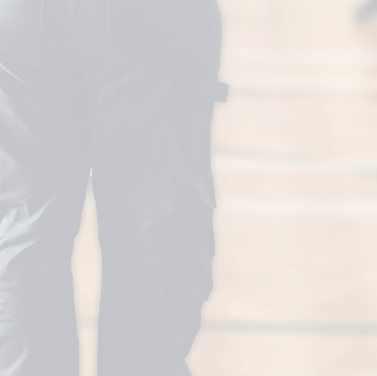
















Hen Mazzig, Iman Qari Asim, Josh Glancy, Yvette Cooper and Anshel Peffer on life after Manchester Inside




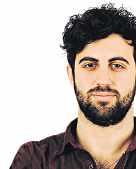




CST mourns the terrible loss of Melvin Cravitz and Adrian Daulby z”l.
May their memories forever be a blessing.
Thank you to our courageous CST security volunteers who protected our community, and who continue to do so.
Thank you to all the shul members who join us in that duty.
We stand with Manchester and our wider UK Jewish community at this time.




If you witness anything suspicious, report it immediately to security personnel, police on 999 and CST on 0800 032 3263 without delay.

Disperse quickly when leaving communal buildings or events. This is especially important at busy times.

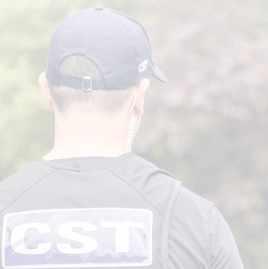



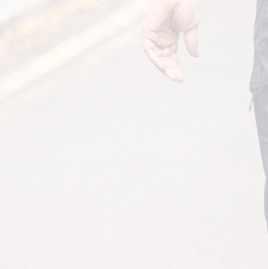

Ensure gates and doors are closed and locked when not in use. When people need to come in, only let in those you recognise or are expecting.
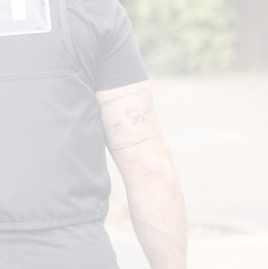
Be alert to anyone trying to follow someone in without being noticed.




If you’d like to learn more about securing and protecting our community, upcoming training courses are listed on the inside-back page.





















by Lee Harpin @lmharpin
Keir Starmer has launched a “comprehensive review” into government e orts to tackle the rise of antisemitism in the UK following the deadly Manchester synagogue terror attack that saw two British Jews lose their lives.
Stung by criticism he has faced following last week’s Yom Kippur attack on the Heaton Park Hebrew Congregation shul, the prime minister has urged ministers across government departments to prioritise urgently a cross-government plan to stem the rising tide of Jew-hate across UK society.
Communities secretary Steve Reed told Jewish News that security of the UK community “is clearly a priority” for the government, after the deaths of Adrian Daulby, 53, and Melvin Cravitz, 63, in last Thursday’s attack at their local shul.
Reed also confirmed that the cross-government review would involve efforts to tackle antisemitism “at source and in all its forms – on our streets, in our workplaces, public institutions, on campus, in the arts and sport”.
Jewish News understands that senior ministers, including health secretary Wes Streeting, education secretary Bridget Phillipson and culture secretary Lisa Nandy, are among those expected in speeches in the near future to further outline moves to counter antisemitism.
Streeting will announce an overhaul of the way medical regulators General Medical Council (GMC) and Medical Practitioners Tribunal Service (MPTS) investigate cases of over concerns they are failing to protect the community.
On Tuesday, a letter was sent by Phillipson
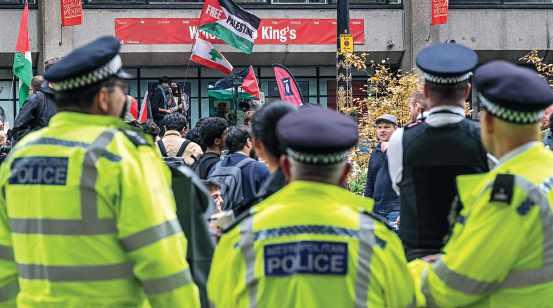
to university vice-chancellors stating: “It is critical Jewish students are able to conduct their studies and to express their Jewish identities on campuses in safety.”
She warned that in the aftermath of the 7 October Hamas attack, and now after the Manchester shul horror, the increase in antisemitic behaviour had become “intolerable”.
The minister was said to be “furious” after learning that students at universities had taken part in anti-Israel protests again on the second anniversary of the Hamas atrocity on Tuesday.
Reed told Jewish News: “Since last week’s horrific attack, the home secretary has announced that she will give police forces new powers to put conditions on repeat protests and she will look more widely at policing protests to make sure o cers have the powers they need to keep people safe.
“I have written to council leaders telling them to use the Public Order Act to protect
Jewish schools, community centres and synagogues, and the education secretary has also written to university vice-chancellors to make sure Jewish students have the support they need.”
Confirming the ongoing cross-government review, Reed said, “We know we need to do more.”
The minister, a long-time ally of Starmer’s, said the Islamist terror attack, carried out by 35-year-old Jihad Al-Shamie, was “a damning indictment of the country’s failure to stop an upsurge in antisemitism that has left so many Jewish people living in fear”.
On Wednesday, as he flew to India, the PM confirmed to journalists that he plans to toughen up laws around the use of chants and banners at Palestine protests that could be seen as being antisemitic or inciting violence.
“I think we need to go further than that in relation to some of the chants that are going on at some of these protests,” Starmer said.
The PM is also concerned that police chiefs are failing to exercise fully the powers they already have under existing laws when tackling rising antisemitism and violent threats from a minority of protesters. Starmer confirmed his government would be “talking at length to leaders of the Jewish community about this, as you would expect”.
Home Secretary Shabana Mahmood confirmed laast Sunday that police in England and Wales are set to receive new powers to limit repeated protests, with o cers authorised to consider the “cumulative impact” of demonstrations when deciding whether to impose restrictions.
Mahmood highlighted repeated concerns raised by Jewish communities since 7 October over pro-Palestine demos, describing the changes as “an important step in ensuring we protect the right to protest while ensuring all feel safe in this country”.
Reed has also written to local authorities urging them to use existing resources and powers to ensure Jewish communities are protected, including limiting protest activity where necessary.
Sources told Jewish News the PM was “angry and upset” after he was informed of last week’s terror attack. “You know how committed he was to tackling the scourge of antisemitism in Labour – he wanted to have that same commitment to dealing with the issue in wider society,” added the source.
One of the first calls the PM made after learning of the attack was to telephone Mark Gardiner, the chief executive of the Community Security Trust.
On returning to the UK, he attended a Yom Kippur synagogue service with his wife, Lady Victoria, in London, along with chancellor Rachel Reeves and foreign secretary Yvette Cooper.

LBY STEVE REED, MP COMMUNITIES SECRETARY
ast week’s Islamist terrorist attack in Manchester marked a terrible turning point for this country. In an echo of our darkest history, Jewish people were murdered at their place of worship just for being Jewish.
It was a damning indictment of the country’s failure to stop an upsurge in antisemitism that has left so many Jewish people living in fear. It was also an assault on our proud and patriotic traditions as a country that embraces a rich mix of di erent communities.
The UK would not be what it is today without our Jewish friends, neighbours and colleagues, stretching back over nearly 1,000
years. We all shared in the Jewish community’s grief and anger at this heinous act on the holiest day of the Jewish calendar.
We saw an outpouring of support in Manchester and across the nation. It is clear that up and down the country, people know that the right choice, the patriotic choice, is to confront antisemitism head on.
This week, we also marked the second anniversary of the 7 October atrocities. As the prime minister said, time does not diminish the evil we saw that day.
I know that these are some of the hardest of times for Britain’s Jewish communities. An ancient hatred of the Jewish community has exploded, and we are seeing record numbers of appalling attacks on synagogues, campuses, Jewish schools and on our streets, alongside rising abuse online.
At my local synagogue this weekend, the rabbi reminded us how abnormal it is that security fences and bomb sweeps have become the norm when attending shabbat.
I want to be clear: this government understands the threat.
In Opposition, antisemitism became a stain on the Labour Party. With Keir’s leadership, we rooted out this racist poison so our party could once again be a safe space for Jewish people.
We didn’t tolerate this hatred in our party and we won’t tolerate it in wider society.
That means doing everything it takes to keep Jewish people safe and working, every step of the way, with the Jewish community, to tackle antisemitism at source and in all its forms – on our streets, in our workplaces, public institutions, on campus, in the arts and sport. And security is clearly a priority.
Since last week’s horrific attack, the home secretary has announced that she will give police forces new powers to put conditions on repeat protests and she will look more widely at policing protests to make sure officers have the powers the need to keep people safe. I have written to council
leaders telling them to use the Public Order Act to protect Jewish schools, community centres and synagogues, and the education secretary has also written to university vice-chancellors to make sure Jewish students have the support they need.
But we know we need to do more.
We will continue to work with you at pace over the coming days and weeks to keep your communities safe and secure, to root out antisemitism from our institutions and tackle these beliefs head-on in schools, on campuses and in our workplaces.
We see this mission against the forces of extremism as one for the whole of government. Whether they’re from the far left or far right or the radical Islamism we saw last week, extremists will have nowhere to hide.
Today, tomorrow and always, we will stand with the Jewish community and for the overwhelming majority who believe the UK should always be a place of compassion, decency, dignity and belonging.
by Lee Harpin @lmharpin
One of the two men killed in the attack on the synagogue in Manchester was a “quiet man” who became a “hero”, mourners at his funeral heard.
Adrian Daulby, 53, leapt from his seat to block the doors of the Jewish holy place as knifewielding Jihad Al-Shamie, 35, tried to get in.
Daulby was killed along with Melvin Cravitz, 66, as the attack unfolded.
His funeral followed that of Cravitz, held on Sunday in Pendlebury, Salford, where around 300 mourners braved the rain to pay their respects.
Family, friends and members of the Heaton Park Hebrew Congregation, led by Rabbi Daniel Walker, filled the cemetery forecourt, listening to the service over loudspeakers.
Rabbi Walker described Cravitz as a man who “loved his community and loved his family”, while synagogue vice-president Rob Kanter called him “a loving, charismatic, humorous man who always meant well”.
He added: “At this time, we can only come together through goodness and hope. I know Melvin –that’s what he lived by and what he would have wanted carried on.”
In a tribute, Cravitz’s family said he would “do anything to help anyone… he was so kind, caring and always wanted to chat and get to know people.”
At the service for Daulby, family members, congregants from Heaton Park Synagogue, including Rabbi Walker, and members of the wider Jewish
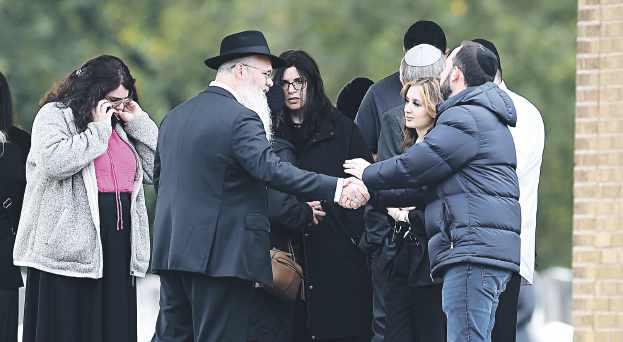
community gathered at Agecroft Jewish Cemetery in Salford to pay their respects.
Giving the eulogy, Rabbi Walker, who was at the synagogue when Al-Shamie launched his attack, said Daulby was sitting in the synagogue in his usual seat, where his late father and grandfather had sat “at that terrible moment when evil struck”.
“A true righteous man,” Rabbi Walker said. “If you don’t mind, I just want to tell you what my friend Adrian did.
“Adrian sits on the back row of the shul. When evil struck, he sought to secure the building. All of you who know and love Adrian know he was a quiet man.
“In that moment of need, that quiet man became a tremendously strong hero.
“I watched him leap from his seat, run to the door. He braced the doors and he held the doors
against our attacker. Adrian didn’t run away from danger. Adrian ran to help. Adrian was righteous in his passing. Adrian was righteous in his life. He was a kind soul, a gentle soul.
“The most important thing is that we live Adrian’s legacy. He was saving the lives of his community. There is none holier, there is none greater, there is none higher.
A great, great martyr. May his memory always be a blessing.”
One of Daulby’s nieces fought back tears to tell mourners: “Adrian will be dearly missed. He never deserved what happened to him. He died a true hero.
“We just want you to know how loved you were.”
A second niece said: “Our tradition teaches us, to save a single life is to save the world. Adrian did just that.”
Rabbi Walker said he had visited the synagogue after the attack
and it was “frozen in time”, Daulby’s prayer book still open at the page at the time Al-Shamie struck.
Dozens of mourners had gathered in autumn sunshine for the service as the hearse arrived for the start of the 35-minute service, which included traditional Hebrew prayers.
Daulby is believed to have been inadvertently shot dead by armed police as they scrambled to stop Al-Shamie as he approached the synagogue doors.
The attacker had driven his car at worshippers outside, attacked others with a knife and tried to storm the shul while wearing a fake suicide belt.
In a tribute from his family, Daulby was described as a beloved brother, loving uncle and cherished cousin. They added: “His final act was one of profound courage and he will forever be remembered for his heroic act.”

Kemi Badenoch used her main speech at the Conservative Party conference to question Home Secretary Shabana Mahmood’s tough stance on repeated pro-Palestine demonstrations, writes Lee Harpin.
Badenoch singled out Mahmood, recalling: “I remember when she lay down on the ground in front of Sainsbury’s protesting because they were selling food from Israel.”
She added a pointed joke: “She tries to convince us she’s tough… right.”
Badenoch continued her criticism by referencing Mahmood’s opposition to the deportation
of foreign criminals, saying: “So forgive me if I treat this newfound tough image with a little scepticism. I remember when Shabana Mahmood tried to stop foreign criminals from being deported.”
She then involved fellow exTory cabinet minister Robert Jenrick, asking:”Do you remember that, Rob?”
In 2014, as she campaigned to protect shechita as a backbench MP, Mahmood also took part in a protest in her constituency against a Sainsbury’s branch accused of stocking goods manufactured in Israeli settlements.

The Green Party voted at its October conference in Bournemouth to urge the UK to designate the Israeli Defence Forces (IDF) as a terrorist organisation.
The motion also called on the party’s elected representatives to push for the UK government and other democratic bodies to support and resource the international case of genocide against Israel at the International Criminal Court, implement a full arms embargo on Israel and end the training of Israeli soldiers by British forces and spy plane flights over Gaza from the British military base in Cyprus.
Israel should also withdraw troops from Gaza, cease operations in Palestinian airspace and ensure the delivery of sustainable aid— potentially via UK shipping, the motion said. Additionally, the party advocated for the deployment of a UN peacekeeping force in Gaza and the West Bank, and called for a formal UK apology for the Balfour Declaration.
Proscribing the IDF would make both membership in and public support for the organisation a criminal o ence in the UK.
Leader Zack Polanski said there was a “moral imperative” to support the motion, adding Israel’s actions in Gaza were not war crimes but genocide, as backed by UN reports.
To cheers, he then tied it to climate justice, saying “colonial oppression and environmental ruin” are linked.
Polanski has repeatedly compared himself in interviews to other Jewish political leaders like Benjamin Disraeli, Michael Howard and Ed Miliband and therefore feels “the responsibility towards rising antisemitism and rising Islamophobia in our country”.
In footage which her opponents have since pounced on, she boasted of shutting the store.
She was photographed with a Free Palestine sign, but since being promoted to government, as Justice and now as Home Secretary, she has adopted a tough stance on those who abuse the right to protest a pro-Palestine demos.
During Wednesday’s speech Badenoch also asserted her commitment to supporting small business owners, crime victims, farmers, and “people who work hard and do the right thing.”
Her big policy announcement was a pledge to abolish stamp duty.
She criticised her political rivals, stating: “Last year, the public voted for change, but all they have been given is change for the worse.
“Parties that in normal times would never be seen as a serious option for government are gaining ground, making promises they can never keep.”
Badenoch took aim at Reform, Jeremy Corbyn, and the Liberal Democrats, mocking their pledges, adding “Reform, promising free beer tomorrow; Jeremy Corbyn, promising free jam; Lib Dems, promising free lettuce; all of them promising more spending, blowing up the public finances.”
by Daniel Sugarman daniel@jewishnews.co.uk
@Daniel_Sugarman
The last week has seen a wide variety of statements from politicians, on both a national and regional level, deploring the Yom Kippur terror attack and expressing solidarity with the Jewish community.
There have also been indications from the government, including from the prime minister, that they understand that sympathy alone is not enough - action is what is needed.
Like many others, I suspect, I have mixed feelings about such action. I certainly welcome Keir Starmer’s announcement of plans to introduce new powers enabling police to crack down on antisemitic chants at anti-Israel protests. But I simultaneously feel bitter, because after years of warnings from the Jewish community, it took terrorist murders to finally see such movement.
I am not a communal leader; doubtless they are in close conversation with the government. All I can give are suggestions for tangible actions which if taken will make life – both for British Jews, but also for this country’s silent majority – immeasurably better.
1. Significantly tighten up laws around protest
Last Thursday, as the Jewish community reeled from the Heaton Park Synagogue terror attack, the Metropolitan police wrote a letter to “Defend Our Juries”, a group which continues to organise mass protest with the aim of breaking the law by expressing public support for a proscribed terror organisation, Palestine Action.
It said that following the terror attack, the police would be significantly stepping up their protection of synagogues in the capital. It made the point that thousands of police o cers who would otherwise be available for that duty would be forced to be present at Westminster due to the intention of “Defend our Juries” to organise a mass-breaking of the law. It asked “Defend Our Juries” to please consider postponing their protest to another weekend.
You can imagine the response the police received. “ACTION TO GO AHEAD AS PLANNED”, read the tweet from the group –“Our response in short: don’t arrest us then.” How? How has our country got to the point where the police are reduced to sending a begging letter to those who openly announce their intention to break the law and support a proscribed terrorist organisation, requesting that they consider breaking the law at a more convenient time? You don’t have to be vaguely political to understand that something is very deeply wrong in a country where that is allowed to happen.
The idea that in a democracy people should have an inalienable right to routinely bring city centres to a halt is complete fallacy. France, Germany and Italy, all robust democracies, have far stricter laws on the right to protest than Britain does.
For the last two years, Jewish communal organisations have made it clear to the government (this government and the last one) and the police that Britain’s laws on protest are woefully outdated – that, for example, the notion of cumulative impact – repeated protests – needs to be looked at when considering permission for protests. At long last, the government appears to be moving on this point. It should not have taken the murder of Jews for that to happen.
But more is required. Even now, the government says it will give the police the ability to make those decisions. I can guarantee you – because we’ve seen it repeatedly – that the police will continue to shy away from doing so, because they don’t want to become embroiled in political arguments.
And on and on it goes – politicians trying put the impetus onto law enforcement, while law enforcement tries to punt it back to the politicians. At this point what is needed is a joint body – of government ministers, police and security service o cials – who make that decision together on banning a protest.
2. Make sure police forces are trained thoroughly regarding any strengthened laws on incitement The Prime Minister’s announcement of tougher laws on antisemitic chants at antiIsrael protests is welcome, but it will only work if police are properly trained with regards to implementation. The current stance of the police, at “pro-Palestinian” protests nationwide, seems to be to often let the most repugnant signs, speeches and other behaviours from protestors, many clearly inciting hatred, go unchallenged.
Everyone in the Jewish community has seen videos of such protestors dehumanising “Zionists” and promoting violent conduct towards them. They have also seen police standing around doing nothing in response

- on many occasions, o cers have appeared deeply confused about what the law is.
Clearly the law needs to be tougher –anyone who can reasonably be viewed as inciting violence at such a protest should be subject to arrest. Police need to be trained to follow that law without hesitation – not stand idly by while hate is allowed to fester and grow.
3. Invest significantly in the Prevent programme Prevent is designed to help identify those
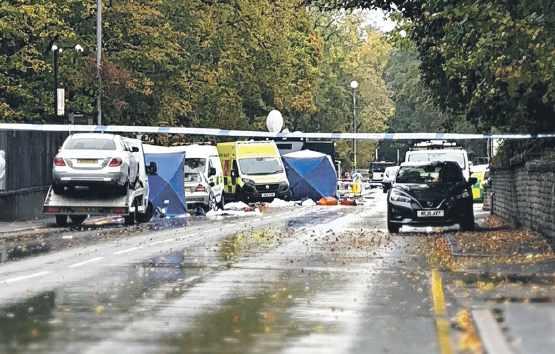
most at risk of being brainwashed into carrying out terror attacks. Contrary to what you might have read elsewhere, this programme focuses on threats posed by all di erent types of potential terror, including both Islamists and the far-right. Over the last few years there have been comprehensive e orts by terroradjacent organisations to destroy the Prevent programme. On the contrary, this programme needs to be significantly strengthened.
Under the previous government, at the same time as it talked tough on the need to support Prevent, plans were made to slash its budget by more than half, to £2 million for the entire country as of April 2025. There’s no indication that the subsequent change of government, halted these plans. £2 million, by comparison, is less than most individual councils around the country annually spend on school taxis. It’s a ridiculous amount to spend on a key counter-terror programme . If successive governments wanted to kill this programme by slowly starving it of funds, they’ve gone the right way about it. If they want to protect innocent people, they might want to start by reversing all such cuts.
4. Strengthen professional consequences for hate speech
Over the last two years, certain British doctors have regularly ranted about “Jewish supremacy” in the UK and its supposed control over British society. Some have posted screeds against synagogues, Jewish schools and other centres of Jewish communal life –and they have received absolutely no come-
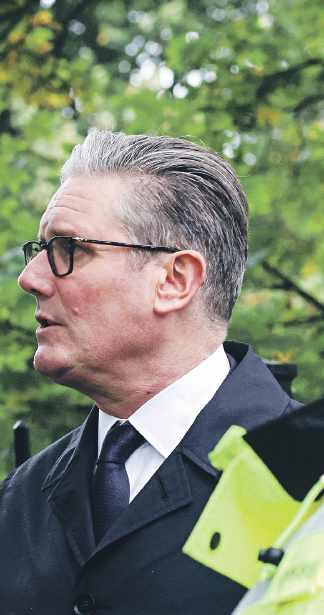
speaking to Prime Minister Keir Starmer
uppance for doing so. Within the past few months, two “Jewish supremacy” rant doctors have been allowed, by a Medical Tribunal, to continue to practice medicine.
I want to share a screed posted by one of those doctors, in response to news that hospitals across Manchester were ‘on lockdown, with people told not to attend A&E’ after the Synagogue terror attack. She said:
“This is extremely concerning. A hospital is a pillar of civic society, a sanctuary of care that must remain universally accessible.

When the State commands these institutions to close their doors to all but the most critically injured, it weaponizes public health and safety. It effectively places a specific community’s security above the healthcare of the entire population, creating a dangerous and discriminatory precedent. This action frames an entire group or community as so separate, so uniquely threatened or threatening, that the normal functioning of society must be halted for them.”
You can judge for yourselves whether a doctor who responds like thtat to news of a terror attack on Jews can be trusted to safely treat Jewish patients.
The regulator – the GMC – seems utterly toothless. The Medical Practitioners Tribunal Service appears hopelessly compromised, given its deranged ‘judgments’.
The health secretary has now announced plans to make it easier to strike off doctors who have made clearly racist statements before such tribunals take place – if enacted, these will be a clear step in the right direction.
But this is hardly limited to medicine. In the last two years, British Jews have seen those from a wide variety of professions –lawyers, teachers and social workers, to give just a few examples - openly exhibit the most repulsive sentiments towards Jewish people and their belief in the right of Israel to exist. There has been little, if any, comeuppance –why would there be, when trade unions are full of activists who themselves subscribe to such sentiments? If the government does not roll out tougher sanctions for hate across all sectors of society, it will inevitably lead to Jews effectively being driven out of entire professions – a hideous throwback to the antisemitism of the Middle Ages.
5. Change the law to end the ‘Judicial Review’ culture
Deeply odious individuals are currently using the judicial review process to attempt to try and overturn the government’s proscription of terrorist organisations - both in regard to Palestine Action, as well as Hamas itself.
The Judicial Review culture in this country has profoundly and negatively affected Britain. In January the government

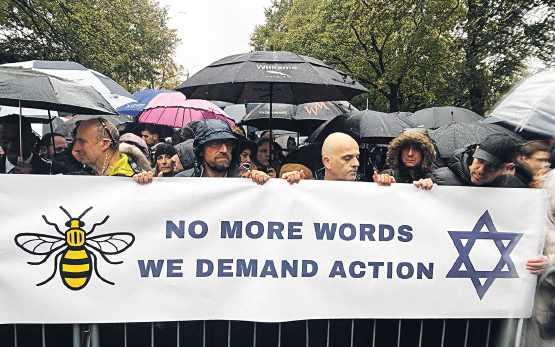
announced it would seek to end “challenge culture” with regards to the countless infrastructure projects which have been held up by people using the judicial review progress to block developments. The same should be instituted with regards to deeply tendentious efforts to overturn terrorism proscriptions.
Any organisation which has been proscribed as a terrorist organisation has received this designation after the Home Office has made a case to Parliament, whereupon our elected MPs have had the choice whether to proscribe said organisation or not. The courts should not be allowed to overturn Parliament’s decision in this regard – government should legislate to ensure such proscriptions cannot be overturned by a judicial decision.
6. Clamp down on your own MPs expressing support for the hate marches and opposing proscription of a terrorist group
There are, unfortunately, a significant number of Labour MPs who have expressed opposition to the proscription of Palestine Action (some have falsely claimed it is ‘non-violent’, which would surprise the police officers previously hospitalised by some of its activists).
Likewise, watching Labour MPs join marches which have contained despicable examples of antisemitic behaviour sends an appalling message to many British Jews. Presumably the presence of any Labour MP at the recent Tommy Robinson-aligned “Unite the Kingdom” protest would not have been tolerated – why should this be any different?
Labour may pride itself on being a broad church, but perhaps it’s time to make clear that there are limits on just how broad it is prepared to be.
7. Urgently fix the broken culture at the Crown Prosecution Service
In 2022, in a now notorious case for the UK Jewish community, a convoy of cars flying Palestinian flags drove through north London. One of the cars had someone on a loudspeaker, and among the disgusting comments videoed by passersby was a call to “F*** the Jews, rape their daughters.”
The CPS ultimately dropped charges against all four people in that vehicle.
This is far from the only time that the CPS has dropped charges when antisemitism has been involved. The Campaign Against Antisemitism has had significant success in private prosecutions it has brought against those promoting the most vile Jew-hate – but it should not have had to bring such cases at all. The reason it felt the need to do so is because the CPS has so consistently dropped the ball.
Last month we learned the terror charge against a member of Kneecap would be dropped, and not because it had emerged that he was innocent of the charge of supporting Hezbollah. No, it transpired that the CPS had six months to officially receive approval from the Attorney General; they sent him the requisite approval request on the final day of that six months, meaning approval was not received in time and the case was dismissed. It is hard to think of a more obvious example of – at best – abject incompetence.
Our Prime Minister was previously director of Public Prosecutions at the CPS (not when any of the above cases were with the organisation). The CPS is separate from the Government – the Attorney General has nominal responsibility for its work but has no proper oversight power. It cannot be right that the CPS is not answerable to any outside authority – we have ample proof of the failures which have no doubt in part resulted due to that lack of oversight. At the very least the Government should legislate to require the CPS to be accountable to both the AG and to a cross-party group of Parliamentarians –the latter so as to preclude charges of government tampering. Not just British Jews, but all communities, deserve to see justice properly done.
These are just a few key areas in which the government could – and should – act to improve life in Britain. The alternative is to preside over a gradual slide into anarchy, and what could well be a mass-exodus of British Jews over the coming decades.
The government has the power to reverse this, to right many wrongs and to protect its minorities more effectively. Leading politicians could properly commit to the above steps – or they can mouth platitudes.
The choice is theirs.
One of Manchester’s most prominent concert venues has been heavily criticised for ignoring Jewish community concerns about a hate preacher it hosted earlier this year – after it transpired his social media account was one of a small number followed by the terrorist who carried out last week’s attack on Heaton Park Synagogue, writes Daniel Sugarman.
Bridgewater Hall hosted Sheikh Mishary Alafasy, a Kuwaiti cleric, in January, ignoring concerns highlighted by the Jewish Representative Council of Greater Manchester and Region (JRC) about extremist antisemitic comments by him.
A JRC statement said: “Despite raising our concerns regarding previous racist and inflammatory comments made by Sheikh Alafasy including calls for violence against Jewish people and social media posts accusing Jews of condoning child rape, the Trustees of the Bridgewater Hall and Leadership of Manchester City Council have not seen fit to cancel this event.
“To allow an extremist a prominent platform in one of our city’s most iconic venues makes a mockery of the assurances we have received to tackle antisemitism in all its forms. It also raises the serious risk of further

attacks on Jews and the Jewish community in Greater Manchester.”
On Sunday, The Sun newspaper revealed Alfasy’s Twitter account was one of just ten followed by Jihad al-Shamie, who targeted Heaton Park Synagogue last Thursday.
In a TV interview on Monday, JRC chief executive Marc Levy responded to the venue’s response to his organisation, saying the concerns were initially ignored and at a meeting later “dismissed out of hand”.
Levy, whose father was providing security outside Heaton Park Synagogue on Yom
Kippur and was directly involved in e orts to bar the door to prevent the terrorist entering, said of Bridgewater Hall: “We were made to feel like we were being unreasonable.”
He continued: “It subsequently transpired that the terrorist who attacked my community on Thursday, on Yom Kippur… had been following this Sheikh online… it’s not inconceivable that he would have been at the Bridgewater Hall that evening.”
In January, the JRC highlighted how on 7 October 2023, the day of the Hamas atrocities, Alfasy wrote in a post to his 15 million followers on Twitter: “O God, cast terror into the hearts of the Zionists.”
Another post from Alfasy later in October 2023 claimed falsely that Jewish law permits the rape of non-Jewish girls once they reach the age of three, arguing this “proves that they are the animals”.
Previously, he wrote of the Abraham Accords in 2020 between Israel, the United Arab Emirates and Bahrain: “There is no benefit in normalisation with the treachery/ betrayal of the Jews. No matter what [countries] signed agreements with them” and criticised what he termed “the eagerness of the Jews to wage wars”.
The BBC has reportedly apologised for internal messaging sent via the organisation’s intranet, which referred to 7 October 2023 as an “the twoyear anniversary of the escalations in the IsraelGaza conflict” and featured a picture of subsequent destruction in Gaza rather than the mass-terror attack on Israel.
An article shared with BBC sta via the organisation’s internal “BBC Audiences” site was introduced with wording stating: “As we reach the twoyear anniversary of the escalations in the Israel/ Gaza conflict, we asked UK audiences what they want and need from news coverage moving forward.” Jewish News understands that a picture of Gaza was used since the article itself was specifically on about current audience attitudes towards coverage of the conflict, rather than specifically about the attacks of 7 October.
A BBC sta member, who wished to remain anonymous, said: “It is shocking that such a description of a one-sided atrocity is used in, of all things, a briefing about audience expectations from the BBC! It demonstrates – again – unconscious bias and terrible insensitivity.” Adam Ma’anit, whose cousin Ma’ayan Idan was murdered on 7 October –her father Tsachi was taken hostage by Hamas and murdered in captivity – said: “To use that language and framing is incendiary and insulting.”
The BBC said: “This internal sta email should have been worded di erently and we’re sorry for any o ence caused. We are editing it and will replace the text on our intranet.”




























by Jenni Frazer @Jennifrazer
To stand in Trafalgar Square on a blustery October Sunday afternoon was to remove any doubt about how much British Jews are hurting.
This was a rally, planned months ago and supported by every single major Jewish communal organisation and religious denomination, to mark the second anniversary of the Hamas mass-terror attacks against southern Israel on 7 October 2023. But there was universal pain etched on the faces of the crowd and the speakers as people fought to explain — to themselves — the most recent horror of the terror attack on Yom Kippur at Heaton Park Synagogue in Manchester, where two Jews were killed.
The square holds a maximum of 5,000 people and the place felt full. But this event, chaired with great dignity by Henry Grun-
wald KC, was not about numbers: it was about bearing witness, giving testimony, and also about resilience.
Board of Deputies president Phil Rosenberg underlined that message, telling the crowd that he had spent Shabbat in Manchester with the Heaton Park congregation. Amid the weeping and the prayers, he said, “We even danced together”, displaying “Jewish joy, Jewish pride. We, the Jewish people, refuse to be cowed”.
The Manchester attacks threaded like a bloodied ribbon through the presentations of every speaker, from “proud but deeply anguished Jewish Mancunian” Keith Black, who is chair of the Jewish Leadership Council, to the chief executive of UJIA, Mandie Winston, who read out a heartbreaking list of 17 British citizens who were murdered on 7 October 2023.
In his defiant address, Black said that the community had feared that the murders of
2023 would “spill over into this country.” Manchester, he said, had only proved that fear to have been justified, and he declared — to agreement from the crowd — that “antisemitism in this country is out of control.” That would have been no surprise to at least one member of the Trafalgar Square crowd — the government’s advisor on antisemitism, Lord Mann.
But Black understood the spirit of the day by also declaring: “This is our home and we will not be driven out. We will stand firm, resilient, well-organised and brave. The leadership of this community is determined to fight back and protect our way of life”.
By every light it was a day of heightened emotion and heartbreak; not least in a video address from former British-Israeli hostage Emily Damari, who urged the community: “Use your voice — this is not the time to be quiet.” In this, she was echoed by the Israeli embassy consul-general, Sima Doovdevani,
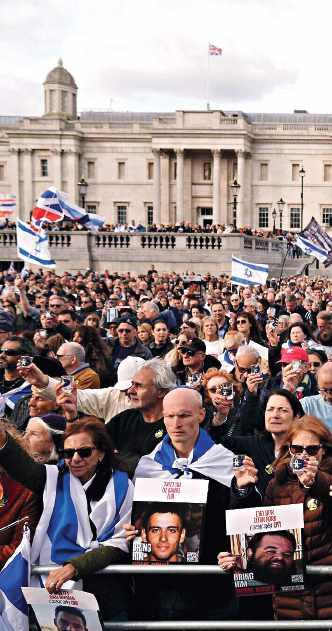
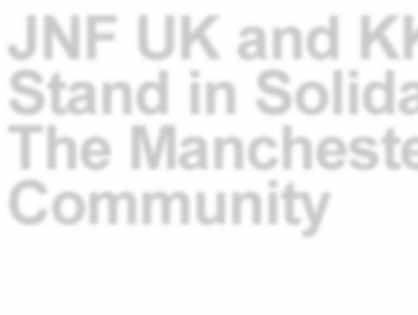
In the wake of the heartbreaking attack on Heaton Park Synagogue, JNF UK and KKL E&T stand beside Manchester with heavy hearts and unwavering solidarity.

Our thoughts and prayers are with the victims, families affected, and the entire Manchester Jewish community. At this painful moment, we extend our deepest condolences and our heartfelt support.
Please know that you are not alone. We mourn with you, we pray for healing, and we commit to help building a future where our communities can thrive in safety and peace.
020 8732 6100 jnf.co.uk/subscribe
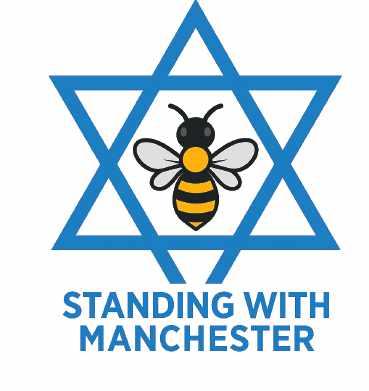






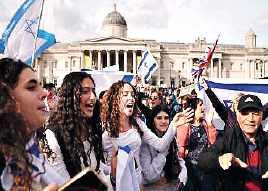
who said that “silence in the face of terror is not an option”.
Perhaps the most moving contribution came from Shaun Lemel, a survivor of the Nova Festival massacre. Still just 26, he had been living and working in Connecticut and had come back to Israel for a family visit when he was persuaded by friends to buy a ticket to the music festival. More than 300 Nova Festival attendees were murdered by Hamas terrorists on 7 October.
At times seeming on the edge of tears, he recalled: “At 6.18 am I was dancing and having the time of my life. At 6.29 am the music stopped”. The terrified young man realised he was close to being either murdered of kidnapped — and passed out. He was saved by friends who rescued him — and he in turn helped to save three complete strangers — “who are now family.”
There was powerful testimony, too, from Sharone Lifschitz, a British-Israeli filmmaker whose parents, Oded and Yocheved,


were kidnapped by Hamas. Her mother survived and was released in November 2023, but her father was murdered. Nevertheless, she told the crowd: “Today we choose to feel the pain and not to turn our fear into hate — so that the memory [of the dead] will be a blessing”.
Adam Ma’anit, communications manager at the Board of Deputies, spoke with anguish of the deaths of his family members. His cousin, Ma’ayan Idan, aged 18, was murdered by Hamas terrorists on 7 October and died in her father Tsachi’s arms. Tsachi himself was taken hostage by Hamas and later murdered in captivity.
Chief Rabbi Sir Ephraim Mirvis gave a powerful rendition of the prayer “El Maale Rachamim”, while Progressive Judaism co-leads, rabbis Charley Baginsky and Josh Levy, recited Psalm 121 - “I shall raise my eyes to the mountains, from where will my help come? My help is from the Lord, the Maker of heaven and earth... Behold the Guardian of Israel neither slumbers nor sleeps.”
The rally concluded with the lighting of 23 candles to represent the 23 communities where the Hamas attacks took place. Fittingly, the 23rd candle was lit by Holocaust survivor Mala Tribich.
There was a powerful police and CST presence in Trafalgar Square. Most attending echoed Henry Grunwald’s hope that it would be the last such rally — and that the call to “Bring Them Home” would shortly be realised for the remaining hostages.








BY HEN MAZZIG SOCIAL MEDIA INFLUENCER
When Yom Kippur began, I knew I had to keep my phone on. Something told me not to log o , not to allow myself the quiet of synagogue. Instead, I felt I had to stay vigilant – because something awful was coming.
The next morning, news broke from Manchester: two Jews murdered outside Heaton Park Synagogue, others wounded, worshippers terrorised.
The attacker, Jihad al-Shami, tried to storm the building during Yom Kippur prayers before being shot dead by police. He had come to kill Jews on the holiest day of our year, and he succeeded.
It was the nightmare every Jew in this country has feared for years.
And yet, even as our community reeled, the response on Britain’s streets was not silence, not reflection, not a moment of quiet and grief, but celebration.
At Liverpool Street station, Free Palestine demonstrators chanted “From the river to the sea” and “Zionism is a crime”. In Edinburgh, protesters clashed with police.
Outside Downing Street, mobs with Palestine flags pushed against the barricades.
The blood in Manchester had not dried, and still the slogans rang out calling for the eradication of the Jewish state – as if Jewish lives taken senselessly on a Jewish holiday was not a reason to pause, but to double down.
It felt familiar, like we’ve been through it before.
Online, it was even worse. Some expressed sympathy, but too many justified the attack as “inevitable”. Some said it’s “a false flag”, that Israel is behind the attack, Jews doing it to themselves. Others wrote bluntly that we “deserved it”.
Then I realised why it felt familiar. It was the same feeling I had on 8 October 2023 all over again – the day after Hamas slaughtered 1,200 Israelis and kidnapped hundreds more.
When the world moved immediately to excuses, explanations and erasure of Jewish su ering.
That morning after, Jews understood something had broken. Now in Manchester, the same truth stares us in the face: Jewish life and safety in Britain is negotiable.
The government’s reflex is to o er “more security”. Synagogues, schools and Jewish homes will be turned into fortresses.
But why should Jews accept living under armed guard when Christians and Muslims in Britain worship freely and safely? Why must our children walk through metal detectors to access what others take for granted?
The real question is not how many more cameras and guards can be deployed – it is why the UK tolerates a movement that normalises hate until it spills into murder.
More security now is an admission of failure by the government.
The evidence has been there for months. More than 8,000 antisemitic incidents have been recorded in the UK since 7 October 2023

– Jewish pupils bullied in classrooms, Jewish patients refused medical treatment, families leaving neighbourhoods plastered with Palestinian flags and anti-Israel gra ti. Week after week I see it, marches in central London where dozens are arrested for hate crimes, only to be released within hours.
Antisemitism in Britain today is not confined to the far right. It thrives in a toxic alliance: radical Islamists who cloak themselves in “resistance,” and sections of the political left who see Jews as colonial interlopers.
Together they have created an environment where chanting for the destruction of the only Jewish
state and the murder of millions of Jews is framed as progressive –and where violence against Jews becomes thinkable.
One headline read “This day was always going to come”. Indeed, it did not come out of nowhere.
It came because antisemitism was normalised. It came because leaders chose denial over confrontation. It came because Jewish pain was easier to ignore than the anger of the mob.
Now the same parents who tucked their children into bed on Yom Kippur must send them to school under police protection.
The same rabbis who led prayers must calculate whether enough
guards will show up next Shabbat. The same families who once believed Britain was home must once again wonder if it is.
The UK now faces a choice. It can go on issuing platitudes while another guard is posted at every synagogue door, and everyone waits for the next attack.
Or it can face the truth: that the chants, the marches, the mobs are not about Israel’s policies – they are about Jewish existence itself. Instead of preaching to Israel how to keep its Jews safe, the UK government must ask itself why it can’t keep its own safe.
If Britain cannot say that now, more Manchesters will come.
Campaign Against Antisemitism has announced it will bring a court challenge against a recent decision by the Medical Practitioner Tribunal Service (MPTS) not to suspend the licence of a doctor notorious for rants about “Jewish supremacy”, with the group describing the case as “one of the most egregious examples we have encountered of a regulator failing in its duty to protect the public.”
Last month, the MPTS heard the case of Dr Rahmeh Aladwan, a self-described “British-
Palestinian” doctor now infamous within the British Jewish community for such claims as “the UK is occupied and controlled by Jewish supremacy – in fact, most Christian majority countries are”, and that the Royal Free Hospital in London, which has a large number of Jewish patients given its location, is a “Jewish Supremacy Cesspit”.
The General Medical Council had applied for a suspension of Aladwan’s medical licence while it conducted an investigation into her conduct. An MPTS panel ruled that the
doctor – also known for statements such as
““I don’t condemn Hamas. I don’t condemn October 7. I don’t condemn armed resistance to Occupation. I condemn ‘Israel’” – should keep her licence while the GMC investigation continues.
Aladwan, who was a member of Palestine Action before the organisation was proscribed as a terrorist group, has also targeted Jewish schools with her invective, tweeting that ““The total number of anti-supremacist (antiZionist) Jewish schools in the UK is ZERO.
There are 136 Jewish schools in Britain, many of which are funded by our taxes, where 36,064 British Jewish children are taught that they are superior to non-Jews, that they have the right to colonise Palestine and are groomed through birthright trips to become colonisers, upholders of apartheid, and genocidal IOF terrorists. This has to stop.”
At a pro-Palestinian demonstration in Leeds during August, she claimed a quarter of UK MPs are “collaborators and foreign agents” for Israel.

The ongoing war in Ukraine has meant a catastrophic learning crisis for children. They are falling far behind and are traumatised.
Thousands of children are waiting to be supported; thousands of children need your help.
By donating this Rosh Hashanah, you are giving them psychological support, educational support and the chance of a better future.

This Rosh Hashanah will you give a child a future?
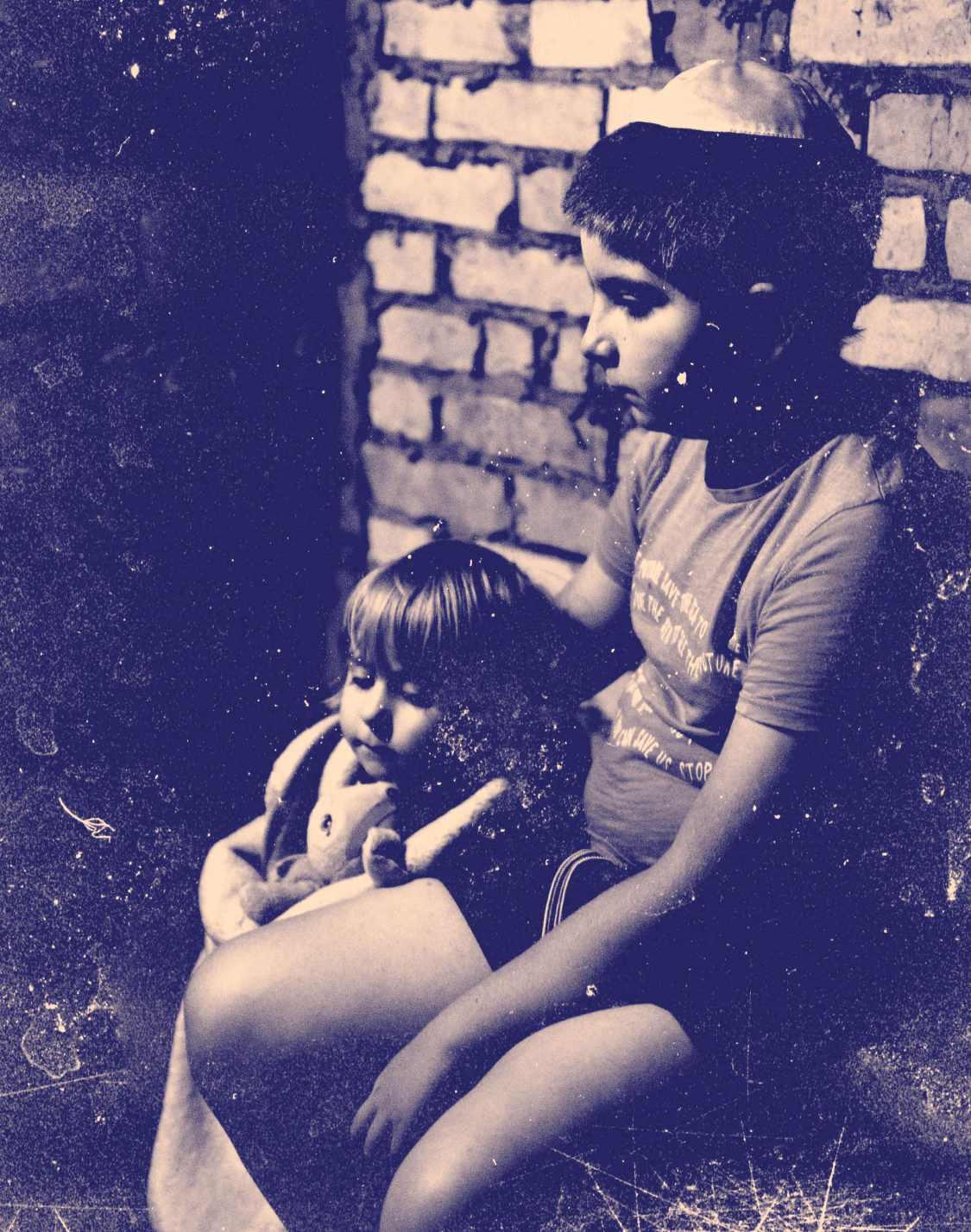
Conservative peer and former cabinet minister Michael Gove has called on Keir Starmer’s government to introduce a “fundamental and comprehensive anti-extremism strategy” following the terror attack in Manchester, writes Lee Harpin.
Gove – now editor of The Spectator and a member of the House of Lords after stepping down as MP for Surrey Heath last year – spoke to Jewish News at the Conservative Party conference in Manchester.
He admitted that while in government he had tried to develop “an effective response” to both Islamist and far-right extremism, but ultimately his efforts fell short.
“We didn’t deliver it effectively. I must take my fair share of blame for that,” he said.
Reflecting on last week’s Yom Kippur attack just a 20-minute drive from the conference venue, Gove noted both the Jewish and wider community would “have been left heartbroken by what happened,
but not surprised – there have been warnings about the rising tide of antisemitism, and they haven’t been heeded,” he said. “I hope now they will be.”
Asked what action the government should take in wake of the attack and amid growing concerns over future threats, Gove was clear: “The action that is required is a fundamental and comprehensive anti-extremism strategy from the government.”
Gove was present at last week’s Labour Party conference in Liverpool, where he was seen in discussions with senior Labour figures.
On Labour’s response to the extremist threat, he said: “There has been a failure to analyse where the roots of antisemitism are, and to take that on. It requires a degree of honest intellectual heart-searching.”
The Labour government should adopt the framework set out in his own anti-extremism strategy, he said: “The tools are there for the government to deliver it.”

also expressed continued support for current Conservative leader Kemi Badenoch, despite internal criticism and speculation about her future.
“Kemi has all the qualities of leadership and integrity necessary,” he said. “It is always difficult for a party after 15 months, following 14 years in
Ten Greater Manchester MPs have joined the Jewish Representative Council (JRC) in calling for Manchester Academy to cancel a concert next month by Bob Vylan.
They are warning the rapper’s record of inflammatory language, which surfaced at this year’s Glastonbury, “crosses the line from legitimate political discourse into antisemitism incitement”.
In a detailed statement, the JRC said it was “deeply concerned” by the venue’s decision to host the artist
on 5 November, highlighting behaviour they described as “hateful and dangerous”.
“We are deeply concerned by Manchester Academy’s decision to host Bob Vylan, an artist who has repeatedly engaged in rhetoric that crosses the line from legitimate political discourse into antisemitism and incitement,” the JRC said.
“We are even more alarmed given that the director-general of the BBC accepted that he was responsible for an antise-
mitic broadcast covering their Glastonbury performance – one that directly led to an increase in hate crime against the Jewish community,” the JRC statement said.
The performance also drew condemnation from Chief Rabbi Ephraim Mirvis, who called the broadcast “a national shame”, while the US State Department revoked the band’s visas citing “hateful tirades”.
Manchester Academy has been approached by Jewish News for comment.
Jewish medics in South Africa have expressed anger and “deep concern” over moves by SAMA, the country’s umbrella medical association, to cut ties with the Israeli Medical Association.
SAMA issued a statement announcing the “immediate suspension of all professional and bilateral relations” and called for the Israeli body’s suspension from the World Medical Association.
SAMA claimed its deci-
sion followed “extensive consultations”, but the South African Association of Jewish Mental Health and Allied Practitioners (SAJMAP) has asked for clarification of this.
In particular, the Jewish medics want to know who was consulted on the issue, asking: “Did SAMA explicitly seek the views of members who support ongoing collaboration with Israeli clinicians, including Jewish members and others who regard boy-
cotts as unethical and countertherapeutic?”
In their rebuttal of the SAMA move, the Jewish medics said “discussion about Israel within South African medical circles has unfortunately become increasingly polarised and harmfully exclusionary, with selective publication practices and limited opportunities for balanced response and robust debate.
“SAMA has been directly implicated in this”.
government, but the important thing to do is to hold one’s nerve.”
He praised Badenoch’s conference speech on Sunday, saying it showed “the right lessons have been learned from the defeat” the Tories suffered at the last general election.
Gove served in Cabinet for nearly all the Conservatives’ 14 years in









power, holding senior posts including education, justice, environment and housing secretary under four prime ministers, from David Cameron to Rishi Sunak.
He was also seen attending last month’s Reform UK conference but has since voiced scepticism over Reform leader Nigel Farage’s ability to address the country’s challenges.
Gove, who was handed a peerage in former prime minister Rishi Sunak’s resignation honours list in April, said there should be “collective” scrutiny of Reform UK’s policies ahead of the next general election.
“We need to make sure that collectively we hold Reform to account,” he said. “It’s understandable that people are exasperated with mainstream politics and feel that supporting Reform is the right way forward.”
However, he added: “But we still have a long way to go before the election and during that period, we all have a responsibility to hold Reform to account for their policies.”






Calling all Prospective Nursery & Reception families
Places available for September 2026
Limited places across the school available for 2025
Open morning, 10am Tuesday
21st & 28th October and Sunday 2nd November, 10am to 12noon. Children welcome, registration essential.
There will be guided tours of our wonderful school where you will get to meet our Head Teacher and see the school in action! Please let us know if these days are inconvenient to organise an individual appointment. Looking forward to welcoming you.
To register please call the office on: 020 8202 7704 or email: admin@hasmonean-pri.barnet.sch.uk
Hundreds of British Jews have applied to become volunteers for the Community Security Trust (CST) since last Thursday’s terror attack, with the charity describing the surge in membership applications as “a powerful reflection of the community’s resilience and strength”, writes Daniel Sugarman.
In the wake of the atrocity in Manchester on Yom Kippur, more than 300 people from the community have signed up for training to become volunteers with the trust, with 150 of those sign-ups taking place within 24 hours of the attack itself.
Responding to the surge in applications, a CST spokesperson said: “We are extremely grateful to the members of the community who have stepped up to apply to become CST volunteers.
“This shows a powerful reflection of the community’s resilience and strength.
“We are also incredibly thankful for the generous donations, many of which come from people who aren’t Jewish, but wanted to show their sympathy and support.”
In the aftermath of the attack, a number of members of the public, including Sunday Times writer Charlotte Ivers and former army

officer Andrew Fox, announced they had donated to the CST, and encouraged others to do likewise if they were able.
A GoFundMe page started by
Fox has raised more than £17,000 in its first four days.
The CST trains volunteers from the Jewish community to provide security outside synagogues and at communal events, giving an extra level of protection to British Jews.
On Friday, the organisation confirmed a CST volunteer was among those hurt during the Manchester onslaught, saying: “one of our CST personnel was seriously injured in yesterday’s terror attack at Heaton Park Synagogue.
“We pray for his continuing recovery and salute the courage of all those who helped stop the terrorist from getting into the shul.”
A bake sale for Palestine scheduled for the second anniversary of the 7 October Hamas atrocities was postponed by the University of Liverpool students’ union following intervention by Jewish News.
Robbie Williams cancelled an Istanbul concert this week after local authorities cited “security concerns” following an online backlash over his past performances in Israel and his family’s Jewish heritage.
The British singer was due to perform at Ataköy Marina on Tuesday in what would have been the final night of a world tour. Turkish officials confirmed the event had been called off after activists accused Williams of being a “Zionist” and called for protests.
Williams, 51, has faced criticism from proPalestinian groups for performing in Tel Aviv in 2015, and again in 2023. His wife, actress Ayda Field, has a Turkish Muslim father and American Jewish mother. The couple are raising their four children in the Jewish faith.
Williams expressed regret at the cancellation, writing on Instagram: “The last thing I would ever want to do is jeopardise the safety of my fans. To end this tour in front of my Turkish fans was my dream, given the close connections my family has with this wonderful country.”
The Liverpool Guild promoted the “Palestine Bake Sale” with a poster that said Time for Dessert. It was organised by LivGlobalRelief, a Liverpool University charity society, together with the university’s baking society.
A university spokesperson confirmed that “following discussions, the organisers of this proposed event have agreed to move this fundraising activity to an alternative date.
• Tax-efficient investing before and after Aliyah
• Tax-efficient income after 10-year tax-free period
• Receive your entire pension pot tax-free
• Specialist portfolio management for Olim
• No Inheritance Tax (for non-UK-situated assets)
We are seasoned experts in providing long-term financial planning advice for those making Aliyah. Scan the QR code to read more
With investing, your capital is at risk. Tax treatments are subject to individual circumstances and are subject to change.
“We work in close partnership with our Guild of Students, the primary representative body for students at the University, to promote an inclusive, respectful and welcoming campus culture and environment. This includes working with hundreds of student societies, representing a wide range of causes.”
Turkish officials last month cancelled a planned performance by French singer Enrico Macias, citing fears of demonstrations linked to his public support for Israel.
Williams’ Istanbul date was expected to draw thousands of fans and close a run of shows that have attracted more than 1.2 million people worldwide.


TBY YVETTE COOPER, MP FOREIGN SECRETARY
wo years on from the events of 7 October, the worst attack on Jewish people since the Holocaust, we remember all those who tragically lost their lives in that barbaric attack.
For many, the pain and su ering continues, especially the hostages still cruelly held by Hamas, including UK-linked Avinatan Or, and their loved ones who have spent the past two years in torment. We all hope their ordeal will soon be at an end, and we are continuing to work tirelessly towards that goal.
For British Jews, last week’s horrific attack on a synagogue in Manchester makes this year’s commemoration all the more painful, and over recent days, I’ve heard the grief and fear from members of the Jewish community in the UK and overseas.
More than a decade ago, the synagogue I visited this week in Finchley threw open its doors to members of north London’s Somali Muslim community at the start of Ramadan, after their own religious centre was wrecked by an arson attack.
That is typical of the Jewish community in our country, the e orts they have always made to build bridges with people of di erent faiths and to show solidarity with others who have faced the discrimination and abuse that they sadly know all too well.
Now it is up to everyone in our country to stand united against antisemitism and show our solidarity with the Jewish community in Britain that has su ered the most appalling intimidation, abuse and violence since the horrors of 7 October right through to last week’s heinous attack at the Heaton Park Synagogue.
The UK remains unwavering in our commitment to root antisemitism and extremism out of our communities and our country in all its forms. This hatred has no place in the UK and we will do everything in our power to keep the Jewish community safe, and ensure that international debates
THE
on foreign policy are never allowed to justify prejudice or abuse here at home.
In the Middle East, two years on from the massacres of 7 October, after the devastating loss of life and the humanitarian crisis in Gaza since then, the new US-led peace initiative o ers a desperately-needed opportunity to bring this su ering to an end, and restore the hope of a peaceful and secure future to the Israeli and Palestinian people alike.
We will continue to play our part alongside our international partners to support the peace initiative and bring about that more hopeful future, starting with a permanent ceasefire, the release of all remaining hostages, the unrestricted flow of humanitarian aid into Gaza, and

negotiations towards a just and lasting peace. There can be no place in the future governance of Palestine for the barbaric Hamas terrorists who massacred innocent people in Israel two years ago.
But for everyone else who wants to see Israel and Palestine living side by side in peace and security, now is the moment of opportunity, and we must work together to seize it. At home and abroad, that spirit of togetherness and determination in the interests of peace should guide us now.

BY JOSH GLANCY ASSOCIATE EDITOR THE SUNDAY TIMES
After the shofar was blown, stewards rushed us out of synagogue. No hanging around gossiping. No lingering. For once we didn’t grumble. It used to be one of the nicest moments of Yom Kippur: fast complete, marathon of Neilah over, catching up with faces from childhood. Now we hurry home. We don’t need to be told why.
This was the strangest Yom Kippur in my lifetime. Each prayer said in the knowledge it had finally happened. Our worst fear realised. Britain, for so long blessedly immune from the kind of murderous antisemitic violence we’ve seen in France, America, Germany; but no longer. Adrian Daulby and Melvin Cravitz slaughtered at shul. They could have been any of us. This was an attack on every Jew in this country, perfectly calibrated to shatter our sense of safety and wellbeing.
I felt many emotions across the day. Tears pricked at my eyes during kaddish. Fear gnawed at me, as I imagined knife-wielding malice bursting through the doors to slay us in our
pews. I also felt a swelling of pride at the dignity and defiance of our prayer. No one stayed home. We held on to our ancient and most essential rituals, no matter the grim circumstances.
But I cannot pretend something hasn’t just changed. The innocence of Anglo-Jewry, which escaped martyrdom at the Tredegar riots and the Battle of Cable Street and other bitter moments since we returned under Oliver Cromwell, destroyed on Yom Kippur 5786.
What next? I caught one conversation, as I hurried from shul. A middle-aged man, a pillar of the British establishment, congratulated another on his imminent move to Israel. “We’ll all end up there soon,” he added.
It may seem bizarre that in response to a violent antisemitic rampage, people will decide to move to a country where such incidents are a daily reality. But they will. Some will now accelerate plans to move to Israel. Because in Israel they won’t feel alone.
Two years since 7 October. Two years of this exhausting, awful, agonising war drawing us into its maw. Israel is far more present in our lives as a result. In my shul, on these high holy days, there were yellow ribbons for the hostages on every railing. We ended our Yom Kippur service this year by singing a sombre Hatikvah, even though we didn’t feel very hopeful.
Some who wish us ill will claim this somehow makes us de facto Israelis, valid targets for protest or even violence. This is
insidious and wrong and wilfully obliterates the complex nature of Jewish peoplehood.
But it is certainly the case that for many British Jews, the carefully constructed barriers of our diaspora identity are being steadily overrun. This unsettling process began well before 7 October but has entered a new and far more acute phase since that day. Shortly after the attack, I wrote a Jewish News column about how a flood of fierce hatred had washed away the ambiguity of our identity as diaspora Jews. That happened again in Manchester. Will we all end up in Israel? Perhaps that is the eventual fate of the Jewish people. Perhaps the demands of our fraught national project will ultimately force us all to make a binary choice. I hope not.
Throughout this war, amid the antisemitic placards and mounting toxicity online, I’ve maintained that Britain has long been a sanctuary for Jews, its innate moderation inoculating it from violent antisemitism.
Is that now changing, I’ve wondered aloud. Many will conclude it already has and I was naive to hope it might be otherwise.
Just look at Heaton Park.
It’s true even when this war somehow ends and takes the temperature of life down a few degrees, the long-term trends here (and elsewhere) are all heading the wrong way. Online life is making us stupider and angrier. The post-Holocaust taboo on public antisemitism is
crumbling. Our cities are home to large Muslim communities in which Israel has acquired a demonic status and a common corollary of this view, Jew hatred, is sadly all too present.
It is understandable many in these communities feel outraged by what has happened in Gaza, but there’s also no getting away from the fact the character and particular vehemence of this outrage makes life deeply uncomfortable for many British Jews.
Every trend is going in the wrong direction. But it is also worth noting that the vast majority of people in Britain were utterly sickened by Manchester. Many simply will not tolerate what happened.
Some British Jews are furious with Keir Starmer over the recognition of Palestine, but I was still moved to see him and his chancellor and foreign secretary in shul. Every senior politician of every stripe expressed similar sentiments. We are not alone in this country, even if we sometimes feel ourselves to be.
The legacy of Heaton Park will stay with us for decades. It will change us but it need not define us. It must be an alarm call, but it does not necessarily mean such incidents will become a regular part of Jewish life in Britain. It is not the end. I hope it is also not the beginning of the end. But mostly today I pray for Adrian and Melvin. May their memories forever be a blessing. They were the first. May they also be the last.






TBY IMAM DR QARI ASIM
SENIOR IMAM OF MAKKAH MOSQUE LEEDS
he terror attack in Manchester was utterly abhorrent. I extend deepest sympathies to the families of victims, in particular those brutally killed – Adrian Daulby and Melvin Cravitz – and to the Jewish community. There is no place for violence, antisemitism or religious bigotry in our society. We stand in full solidarity with British Jews, who are left grieving and shaken by this act of pure hatred.
This atrocity demands a full investigation into the security lapses that allowed it to occur. But it also requires moral clarity. It is especially painful to learn the Syrian-descent attacker, Jihad Al-Shamie, came from a Muslim background. This vile attacker may have claimed to be Muslim, but his actions stand in direct contradiction to the foundational principle in Islam: upholding human dignity. Islam categorically forbids the taking of an innocent life: “Whoever kills a soul… it is as if he had slain mankind entirely.” (Qur’an 5:32)
British Muslims stand united in rejecting the misuse of our faith – whether weaponised in the name of religion or twisted to justify political grievance.
The desecration of religious spaces and targeting of people based on faith is not only unIslamic – it is inhuman.
Places of worship are meant to be sanctuaries of peace and prayer. The Qur’an upholds the sanctity of all houses of worship: “Had God not repelled some people by means of

others, monasteries, churches, synagogues and mosques – where God’s name is often mentioned – would have been demolished.”
(Qur’an 22:40)
Let us be clear: Jewish worshippers gathering in a synagogue on Yom Kippur – or any other day – are not responsible for the actions of the Israeli government.
Many rabbis and Jewish leaders I have spoken to have expressed deep horror over the su ering in Gaza. They do not all support the policies of the Israeli government in Gaza. We must learn to distinguish.
To conflate Jewish identity with Israeli policies is not activism – it is a dangerous distortion that fuels hatred and violence.
There are British Jews who now feel
unsafe in their own places of worship.
So, this attack at a synagogue is an attack on all of us. It threatens our shared religious freedoms and the kind of society we strive to build: one rooted in dignity, safety and mutual respect.
In the coming weeks, some will try to exploit this tragedy to divide us, others will weaponise this tragedy for short-term gain. This will increase the risk of reprisals at other places of worship. Every faith group should feel safe to pray without fear.
This is not a Jewish issue or a Muslim issue – it is a British issue.
The antidote to hatred is not fear – it is solidarity, compassion and understanding. Everyone has a right to express deep
pain and trauma over the unprecedented suffering of the people of Gaza. But if pain and political grievances are misdirected, they can lead to mistrust, hatred and even violence.
Antisemitism is continuing to grow in our country. As an imam, I say clearly: antisemitism in any form is unacceptable. It has no place in Islam, or in our communities, or in our society.
We must stand shoulder to shoulder to confront and eliminate antisemitism, anti-Muslim hatred and all other forms of bigotry.
Dialogue and bridge-building must remain open between our communities, so that together we can work for peace, coexistence and a flourishing society both here at home, in the Middle East and across the globe.
Educational and inter-community programmes that dismantle stereotypes – on all sides – before they harden into hate, are required at all levels in our society.
The Drumlanrig Accords, signed earlier this year by senior rabbis and imams and endorsed by His Majesty King Charles III, o er a vital framework for resisting antisemitism and anti-Muslim hatred.
They call us to protect life and safeguard places of worship; and deepen trust and cooperation to build a society where all can live with dignity, freedom of belief and justice.
I am committed to work with our Jewish colleagues to ensure the future of Muslim and Jewish life in Britain is not shaped by fear –but by mutual respect, shared responsibility and peace.
Our response to the attack on a British synagogue will define who we are as a nation: fractured by fear or united by hope.
Let us choose unity. Let us choose humanity.
You see them whenever you attend a highprofile Jewish event. They are present outside many of our shuls every Shabbat and Yom Tov, and the schools attended by many of our children. We often rush past them, taking them for granted.
Last Thursday we received the worst reminder imaginable about why they are there.
Many hundreds of British Jews, both men and women, have trained to be CST security volunteers for our community. They are, e ectively, our first line of defence against the sort of horror we saw on Yom Kippur.
Unpaid, they donate their own time to guard us. And, as we saw last week, these defenders – themselves parents, siblings or children – also put their lives at risk. Among
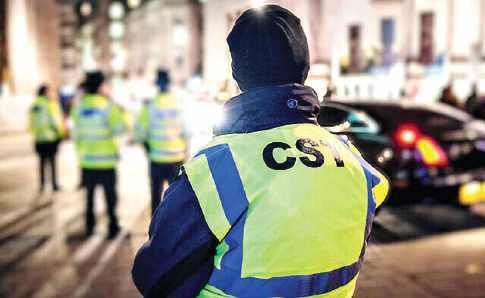
those seriously injured at Heaton Park Shul was a CST volunteer.
In the wake of the Manchester terror attack, more than 300 British Jews have applied to join the ranks of those who defend us. As CST has said, this is “a powerful reflection of the community’s resilience and strength”.
CST has also received a number of donations since last Thursday. Not everyone is in a position to give their time, or their money – but something anyone can give is their thanks.
Don’t just walk by the people who help keep us safe. This week – next week – every week – show them that you appreciate them.
Gratitude costs nothing – but it can mean everything.
Hundreds gathered outside the Heaton Park Hebrew Congregation in Manchester last Friday to remember Adrian Daulby, 53, and Melvin Cravitz, 66, who were killed less than 24 hours earlier during Yom Kippur prayers, writes Annabel Sinclair in Manchester.
The atmosphere was heavy with grief but defined by unity as Jewish residents stood side by side in pouring rain with Muslim and Christian neighbours, holding flowers and standing silently as prayers were recited for the victims.
“We’ve come to pay our respects to the families and to the community,” said one Muslim neighbour. “Melvin was a good man. People need to come together and not allow those who want to divide communities to succeed.”
Another added: “It was very important for us to come and show solidarity with our Jewish friends and families. There are people out there trying to threaten that unity – but we stand together in one cause.”
Police kept watch as Mark Addleman, chair of the Jewish Representative Council of Greater Manchester and Region, urged action from the stage to stem rising antisemitism.
“Jew hatred cannot be allowed to continue,” he said. “No longer can people claim to be antiZionist and yet not Jew-haters. We are proud British Mancunian Jews. We love this country




and we proudly wave the Union Jack.”
Faith leaders echoed his words. Methodist minister Rev Dr Raj Bharat Patta, chair of Stockport’s multi-faith network, called the
attack “an assault on diversity”, while the Bishop of Manchester said: “Hate will never defeat hate – only love will defeat hate.”

the families and this Jewish community.
“Jewish people – our friends, our neighbours, our loved ones – are becoming targets of antisemitism hate simply for who they are.
“But I know this community is strong and resilient. Our country, of all faiths and colours , stands with you.”














Jewish News is delighted to be entering a digital-first era with the launch of a new website and new regular glossy magazine. We are therefore seeking an enthusiastic, emerging sales force to help navigate this new era and to sell these exciting new products alongside opportunities with our portfolio of events and community-leading social media presence.
• Achieving personal and team sales targets. Working to the teams agreed yield and series framework.
• Championing digital first solutions with a particular focus on substantially growing New Business.
• Building and developing strong client relationships and attending meetings and events.
• Identifying revenue opportunities from new and existing accounts and selling solution based integrated campaigns.
• Successfully communicating and introducing digital campaigns to existing print clients.
• Effectively selling across the website, digital publications, social, newsletters, magazines and more.
• Working closely with the Jewish News Publishing and Editorial team to ensure a smooth and commercially successful relationship.
• Working with the Social Team to sell and implement new parthership content.
• Liaise with the Head of Finance to ensure all revenue is accurately reported and invoiced.
• SALARY: Approx 36k plus generous commission package but flexible depending on experience
Email a brief paragraph about yourself (and attach your CV) to Richard Ferrer – richard@jewishnews.co.uk
Greater Manchester mayor Andy Burnham and chief constable Sir Stephen Watson praised the bravery of those who stopped the attacker forcing his way inside the shul. Watson also appealed to pro-Palestine demonstrators to reconsider weekend marches, saying: “You could do the responsible and sensitive thing and refrain on this occasion, out of respect for the Jewish community’s trauma.”
Tension rose briefly when deputy prime minister David Lammy was introduced. Some in the crowd booed and shouted “shame on you” and “go to Palestine”.
Mark Adlestone, also of the Jewish Representative Council, stepped in to restore calm: “All right, we’ve heard enough. We know how we feel. Let’s give the time for our deputy prime minister to address us.”
Lammy pressed on, telling mourners: “Our hearts, our thoughts, our prayers must be with
The vigil ended with a defiant message from Rabbi Daniel Walker, who thanked police and CST volunteers. “Adrian and Melvin died as Jews for being Jews,” he said.
“The only way to defeat darkness is with goodness. We always rebuild, we always recover, we always return stronger.”
By Sunday, the spirit of Manchester had carried to London, where thousands filled Trafalgar Square for the Board of Deputies’ rally marking two years since the 7 October 2023 Hamas attacks – an event now entwined with grief for the Heaton Park victims.
Keith Black, chair of the Jewish Leadership Council and a self-described “proud but anguished Mancunian”, told the crowd the community’s fear of violence spreading to Britain had been realised.
As Holocaust survivor Mala Tribich lit the final of the 23 candles, the message from both cities was the same: grief, resilience, and unity.
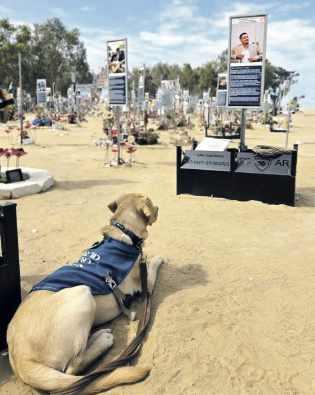

Lisa Marlowe was sent a photograph on the eve of 7 October of a golden Labrador wearing a royal-blue Israel Guide Dog Centre vest, in front of a memorial at the Nova site in Re’im, three miles from the Gaza border. The dog, Jake, is named after Lisa and Michael Marlowe’s son, murdered when Hamas terrorists stormed the Nova festival. Jake, 26 and unarmed, had been working security and was among the first to run towards danger, trying to protect others. Texting from Israel, Lisa wrote: “How special is that?” In a sea of nightmares, it was a single moment of light. “My Jake must NEVER EVER be forgotten,” she added. It was Jake’s love of dogs that led the couple to use funds raised by the weekly Borehamwood 7 October vigil, to sponsor three Israel Guide Dog Centre puppies –Jake, Marlowe and Woody.

LBY RICHARD FERRER EDITOR JEWISH NEWS
ast year, Jewish News was looking to build a new website. We put the work out to tender, as any publisher would, and one company stood out. They were professional, creative and, on paper, perfect. We were excited to get started. Then came the email.
The company had decided it “wasn’t comfortable” working with a Jewish newspaper. The boss told me that while he could insist his sta does the project, “their hearts wouldn’t be in it and the outcome would not be the best it could be for Jewish News ”.
How terribly thoughtful of him.
That was it. No further explanation. Just moral objection to our existence. The company (which I’m sorely tempted to name and shame but will resist… for now) is signed up to a movement called B Corp, whose stated aim is
to promote “high standards of social accountability and address society’s most critical challenges”. You couldn’t make it up. I wrote twice to B Corp asking whether a company carrying its seal of approval refusing to work with Jews was in keeping with its “high standards”. I was told to complete an online form and wait 90 days for a response. That was 446 days ago.
I was angry, upset and quietly heartbroken, but dismissed it as a wretched one-o .
A few months later, the head of a theatre company Jewish News had interviewed to help promote her new Jewish-interest show withdrew permission for us to publish our article, saying “political issues between us” made her uncomfortable appearing in a Jewish newspaper. I remember reading her email in a Waitrose car park, shortly after strolling past the kosher food aisle, where a sign had been put up announcing: “These products are monitored by CCTV.
Security cameras for biscuits. How f***** up is that?
These are just two examples of the quiet isolation we’ve experienced at Jewish News in recent months. Two years in which I’ve kept assuring myself, and others, that this
madness will pass and no one has been seriously hurt. Then two Jews were murdered on Thursday morning outside a synagogue in Manchester. The first deadly antisemitic attack on British soil since the 17th century.
Since Hamas’s massacre in Israel, Jews in Britain have been pushed, slowly – and ever so politely – out of public life.
Jewish actors have been dropped from shows. Jewish comedians told their Edinburgh Fringe gigs are o under the pretext of “sta safety”. Venues have quietly cancelled Jewish musicians. Holocaust survivor visits to schools have been pulled “for security reasons”.
Every time a theatre has cancelled a Jewish performer, every time a company has decided it’s “uncomfortable” working with Jews, the line between silent and savage antisemitism has blurred just a little more.
Now that line no longer exists. On Thursday, Britain became a place where a knife-wielding man called Jihad can convince himself that driving a car into Jews outside a synagogue isn’t an atrocity but a statement.
This weekend, I’m o to a batmitzvah party hoping there’s enough security on the door. That’s life for British Jews now. And death.
To get the best value from your private medical insurance, you should speak to an expert who is qualified to advise you on the right policy for you, and recommend the providers who offer the most competitive premiums.
This advice covers individual, family and company policies, and is always FREE.
As an independent health insurance expert, I work with the healthcare insurers to provide you with the appropriate and most affordable level of cover. So whether you have an existing policy or not, let’s have a chat.
You can contact me at 020 3146 3444 or 07956 244350
trevor.gee@patienthealth.co.uk

The question to our government is simple: what are you going to do? Not say. My God, how they love to say and say and say. Empty words won’t keep us alive. WHAT. ARE. YOU. GOING. TO. DO? British citizens who still believe in what this country is meant to stand for need an unafraid, coordinated response to Islamist extremism and how it is being enabled by the Corbynite hard left. It must be handled with the same seriousness the state confronted the IRA in the 1980s.
Strengthen laws on incitement. Invest significantly in the Prevent programme. Fix the broken culture at the CPS. Deport radical preachers and shut down “charities” funnelling money to Iranian-backed groups. Expel foreign nationals who incite violence on the streets and social media. End the indulgence of doctors, academics and others in positions of public trust who openly support Hamas. And stop the boats. Have the courage to tell hard truths about an evil that has been indulged in plain sight. An evil that has infected our politics, culture, courts, media, education, the NHS and every other corner of public life. It’s even dehumanised people who simply build websites for a living.














































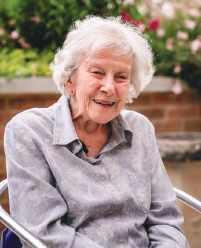



















































BY ANSHEL PFEFFER
In 1934, Oswald Mosley opened the northern headquarters of his British Union of Fascists on Northumberland Street in Manchester, smack in the middle of one of the city’s most Jewish neighbourhoods. This had great attraction for the Mosleyites, who enjoyed marching through the area taunting and picking fights with Jews.
Three years later, the BUF had fallen on bad times as donations dried up and they stopped paying the rent on the building. A local Jewish businessman pounced on the opportunity to buy it and evict the fascists. He gave it to his growing community who needed a larger shul and to this day Machzikei Hadass, or MH as we call it, is at the heart of Chasidic Manchester.
I love that story of how the blackshirts were replaced by the black hats, partly because the wily businessman was my great-grandfather Avrohom Yaakov Pfe er and Machzikei Hadass is our family shul, at least it was until most of the Pfe ers left Manchester and those still there found it becoming a bit too frum for their liking. But mainly I love the story for what it tells us about the resilience and creativity of British Jews and the failure of fascism in Britain.
In an alternative 1930s timeline, you can easily imagine how the opening of a fascist headquarters scared the Jews away. It happened in many other European cities. Not in Manchester. The fascists are gone and Jewish life has continued to flourish.
I wish I could have interviewed my great-grandfather about his story but he died before I was born. All we have is a family myth, backed up by a few lines in scholarly research about fascism and AngloJewish history, and a marble plaque in MH honouring his donation of the building.
I’ve spent much of my career covering and writing about attacks on Jewish communities worldwide. One of the most prevalent responses from readers (usually Israelis or Americans) has been “what the hell are Jews still doing there?” My answer is always “Who do you think you are? You don’t get to tell other Jews where to live. That’s not how Jewish life works.”
On Yom Kippur, as news broke of the terror attack on Heaton Park shul, 20 minutes away from where we once lived, I found myself having that argument in my head. What the hell are we still doing in so many places where people hate us so much?
Actually, I’ve been having that argument with myself for the past two years. Since 10 October, when reporters were first allowed

into one of the kibbutzim devastated by Hamas three days earlier, looking at the piles of bodies being removed from the burnt-out homes. Driving back in shock, I realised I had just witnessed the biggest massacre of Jews since the Holocaust. And it had just taken place in the state that Jews had built as their one secure place on the globe.
And now it’s happened next to Heaton Park where we played as children. Where is a yid going to live if it’s happening both in Israel and Manchester? How can we keep another generation of Jewish children alive, safe and confident to continue living proudly as Jews, however they choose to do it?
There isn’t just one answer; that’s not how Jewish life works. Every Jewish individual and community adapts. And no community has done so better than British Jewry.
Although I have not lived most of my life in Britain, I couldn’t be prouder of being a British Jew. Quite often I’m prouder of that than I am of being an Israeli. I was certainly much prouder of my community of birth when Yom Kippur ended and Israel’s prime minister and foreign minister blamed the British government for failing to act against antisemitism. The government on whose watch more Jews were murdered than under any other in the world in our lifetimes has nothing to teach Britain on how to deal with antisemitism. They need to take responsibility for their failings before lecturing others. If anything, they should learn from British Jews what responsibility means.
The Jews of Britain have overcome every challenge history has thrown at us.
From Edward I’s Edict of Expulsion in 1290, rebuilding from Oliver Cromwell’s resettlement in 1656, despite a bigoted establishment and centuries of discriminatory laws. Just in the past 125 years we’ve faced pogroms in Wales in 1911 and Cheetham
Hill (Manchester again) in 1947, immigration laws preventing Jews saving themselves from Nazi Germany (the kindertransport was the exception, not the rule), fascists in the 1930s and neo-Nazi arson attacks in the 1960s. When the rise of Corbynism ushered in a new fear of a left-wing consumed by Jewhatred masquerading as “anti-Zionism”, the community came together until the decency of the British public emerged to trounce Corbyn in the 2019 General Election.
The Heaton Park murders won’t change that. Because this is how Jewish life works in Britain. You don’t cower behind walls or cancel Jewish events. You recognise the constantly-evolving threat. You act. You don’t wait for the government to take care of your security. You put in place a communal body of professionals and volunteers (ask anyone, anywhere, in the Jewish world, the CST is the gold-standard which every other community struggles to emulate), do your risk-assessment and, just like our parents and grandparents did, carry on.

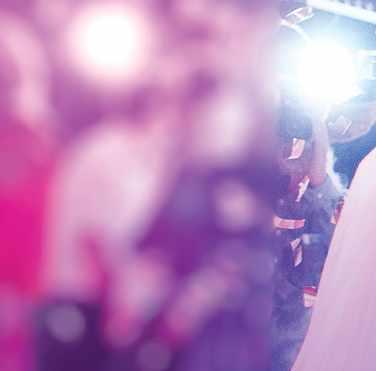

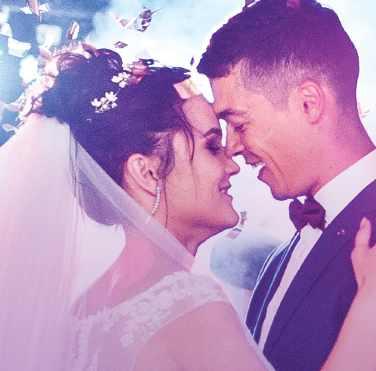


Bar & Batmitzvah



11AM to 4PM SUNDAY 2025 NOV 30


610 The Avenue @ Village London Watford
Centennial Park, Elstree, WD6 3SZ




Eli Sharabi, the first 7 October hostage to write a memoir about his time in captivity, speaks to Annabel Sinclair
When Eli Sharabi began writing about the 491 days he spent chained underground in Gaza, he did not do it to heal himself. He did it, he says, because others urged him to bear witness – and because he wanted his family to be proud.
“In Israel, in the media, even when I spoke at the UN, people said to me, ‘You have to write it. It’s very, very important,’” he recalls. “I thought about it – and they were right. It was very therapeutic for me. It was like sitting with my therapist, talking about all these details. It wasn’t easy, but it was important.”
His memoir, Hostage, published in the UK on 9 October, is already the fastest-selling book in Israel’s history. It is the first direct account from a released Israeli hostage – a raw, deeply personal record of survival, faith, and the unbreakable instinct to live.
Sharabi was dragged barefoot from his home in Kibbutz Be’eri on 7 October 2023, as Hamas terrorists tore through his community. His British-born wife Lianne and teenage daughters Noiya and Yahel were killed that morning. He was taken into Gaza and disappeared into the tunnels beneath the Strip.
“I was chained ninety-nine per cent of the time,” he says. “We were humiliated, beaten, interrogated. In the tunnels, we had one meal a day – when I say meal, it’s one and a half pieces of dry pita bread. Sometimes we waited thirty hours for food while our captors ate four or five times a day. The starvation was the worst thing. You don’t mind that they beat you or humiliate you – but begging for food, that kills you.”
He survived 491 days in captivity. What kept him alive, he says, was a promise.
“They dragged me from the house and I turned my head to my daughters. I shouted to them, ‘I’ll get back’. That promise kept me alive. I didn’t care if I came back with legs or without legs. That’s what I promised, and
that’s what I did.”
For more than 16 months, Sharabi clung to that promise, through darkness, hunger, and grief. He did not - could not - know that his wife and children had been murdered after his promise to them that he would return. Terrorists locked Lianne, Noiya and Yahel in the family’s safe room and set it on fire. He only found out the terrible truth when he returned to Israel and asked to see them.
The book recounts not only the physical su ering, but the quiet moments of faith and connection that helped him endure.
“Even in all this hell, you can find moments when you see the light,” he says. “You can find faith, and the power inside you to survive. That’s what the book is really about.”
The writing process, he says, was painful but necessary – a way to give shape to experiences that defy comprehension. Some passages brought him to tears.
“Of course, it was di cult to remember certain moments,” he admits. “When I wrote about them breaking my ribs, or when the social worker told me about Lianne, Noiya, and Yahel – that was very hard. But I wanted them to be proud of me, to know that I was doing something to remember them. That was the most important thing.”
After his release, he says, freedom itself felt unfamiliar – but extraordinary.
“Freedom makes you appreciate every basic thing in life,” he says. “You don’t need permission to go to the bathroom, to speak, to walk without a chain. You can open the fridge, choose fruit or vegetables, eat whenever you want. You never think about these things until you lose them. In the tunnels, you don’t miss your car or your bank account – you just miss your family. You just want to be with them one more minute.”
Sharabi says the memoir is not about victimhood, but resilience.

“I don’t consider myself a victim,” he says. “I want to show that even in all this darkness, I survived. I could see the light. I could feel faith. My faith was in God. I was very optimistic about my chances to survive all the way.”
His voice softens when asked about the message he hopes readers will take from Hostage
“Appreciation,” he says. “Appreciation for your life, for your freedom. Each one of us has the strength to survive the worst thing ever. You just need to find your reason why. When you have your ‘why’, you can bear anything.”
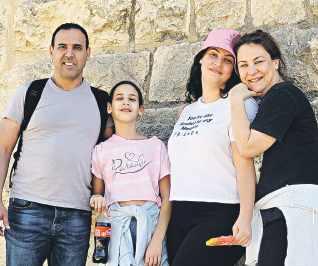
He also hopes his story will help keep the plight of those still held in Gaza at the forefront of public consciousness.
“I don’t want anyone to forget what happened on 7 October,” he says. “Terror has no boundaries. When they invaded our home, they knew my wife and daughters had British passports. They didn’t care. If my book can raise awareness and give even a little strength to the other hostages’ families, I’ve done enough. For me, it’s to be their voice – because nobody can hear them.”
Sharabi speaks simply, without bitterness. What drives him now, he says, is the decision to keep living – and to honour his family through action, not despair.
“I can let grief bury me, or I can find a way to move on. I know I cannot bring back Lianne or the girls, but I’m here. I’m alive. I’m a free man. It’s priceless to be a free man. Their memory will be with me every day until my last day – but it will be alongside my life, not instead of my life. I’m choosing life every day.”
As Hostage prepares for its Englishlanguage release, Sharabi hopes readers around the world will find it accessible – not as literature, but as human truth.
“I told the publisher: use my simple
words,” he says. “I want people to feel like they are there with me – in my house, in the tunnels. In Hebrew people told me they felt like they were there. If English readers feel the same, that will be the greatest success.”
The book is, he says, both a memorial and a message.
“This book is for the memory of my wife and daughters, and my brother who is still there,” he says. Yossi Sharabi was murdered by Hamas after 100 days in captivity.
“I want people to know what Israel and the Jewish people su ered on 7 October. I just want the hostages back.
That’s all.”
He pauses.
“I’m alive,” he says quietly. “And that’s my victory.”
• Hostage by Eli Sharabi (HarperCollins) is published in the UK on 9 October 2025


The drama series about the horrors of 7 October is for everyone who still needs reminding, writes Brigit Grant
If the aim has been to get the world to acknowledge what happened on 7 October, then a drama series with the title Red Alert might just achieve it. It’s a title which suggests the thrills and danger that attract the kind of audience who would not watch a show about the darkest day in Jewish history since the Holocaust. Should that ‘unlikely’ audience take the bait, their interest may be piqued when, 20 minutes into the first episode, a Palestinian woman is murdered. That she is murdered by Hamas terrorists is what they will have to compute.
The woman is the wife of Ayub, a Muslim Palestinian who has lived inside Israel for 20 years. Their baby is in the back seat when she is shot and killed beside her husband by terrorists with AK47s on motorbikes.
This opening isn’t fiction. It’s based on a true story — one of many that unfold in Red Alert, the new Paramount+ drama re-creating the Hamas terror attack on Israel. Born in Gaza, Ayub immigrated to Israel in his twenties. “He married a Bedouin Muslim wife,” explains director and co-creator Lior Chefetz. “He was in limbo in terms of getting his permanent residency because Israel can be slow in approving those requests. Every year he had to renew his ID card,and couldn’t apply for a driver’s licence. That’s why his wife drove him everywhere.”
Chefetz says Ayub’s story captures everything the show stands for - humanity caught in horror, complexity inside tragedy. “We wanted to open the series with a story that no one could politicise. You only feel compassion for this man. It’s about what happened to human beings that day.”
7 October, 2023, was Simchat Torah, one of the most joyful days in the Jewish calendar. Families were gathering for the holiday weekend, many already outside enjoying the early light. But by dawn, the celebration was over. Rockets streaked across the sky and the deadliest day was underway.
For Hollywood producer Lawrence Bender that day changed everything. The man behind Pulp Fiction, Inglourious Basterds and Good Will Hunting, who built his career on genre-defining hits, knew he had to do something.
“A few weeks after 7 October, I was


hosting survivors at my house, having them speak,” Bender recalls. “Early on, we were all asking ourselves, ‘What can we do to help?’”
Then Avi Nir, CEO of Keshet, one of Israel’s largest media companies, came to give a presentation. “As an Israeli he was greatly affected on a personal level,” says Bender. “That morning, the government didn’t know what was going on, but Keshet had reporters already in the field, reading off their cell phone messages in real time: ‘There’s a terrorist in my kibbutz!’ ‘There’s a terrorist trying to break down my door!’ He was seeing it as it happened. It was extremely
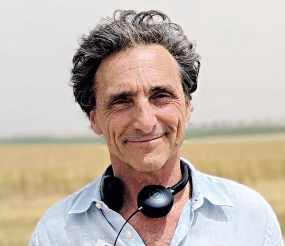
emotional, and afterwards I said to him, ‘Listen, we’re going to have a big problem. It’s already clear that the world is turning against us. We need to work together.’ And that’s how it began.”
Red Alert dramatises the intersecting
stories of Israelis who found themselves in the path of terror. Families from kibbutzim, Nova festival goers, soldiers, and first responders. Filming in Israel presented challenges unlike anything Bender had seen in Hollywood. “The Israeli crew had a third of the amount of people needed, and we didn’t have the same access to equipment or technical toys but somehow, we had to accomplish the same amount,” he says. “But creativity is creativity. And the chutzpah! If there’s one minute left to get a shot and the director says, ‘I need this,’ the crew literally picks up the camera and runs up a hill. We get the shot, and that shot’s in the show.”
There were moments when fiction and reality collided. “We were filming a scene in the Gaza envelope with actor Rotem Sela, who plays real life mother Bat Sheva Yahalomi. She’s with her daughter and baby, taking a breather as they’re escaping, and in the background, you hear bombs going off in Gaza. You actually hear the war going on. We had to carry portable concrete safe houses. If an alarm goes off, you have fifteen seconds to run into one.”
Chefetz describes writing the series as a kind of emotional survival. “In Hebrew, they say, ‘When the cannons fire, the muses are silent.’
In war, it’s hard to create, but after two or three months, I felt I needed to write something. I couldn’t just sit at home. Being passive and just absorbing news wears you down emotionally.” He refused Red Alert when first approached. “I said, ‘No, I can’t handle it. It’s too much.’ But by the end of December, I said yes.”
The creative challenge was to humanise an event already saturated with politics and headlines. “7 October ended that day, but
incited something huge that keeps rolling,” says Chefetz. “To put margins around it, dissect it, and focus on that event, we wanted a true representation of different communities.We approached survivors, asked if they wanted to talk. Some said no, sometimes yes,” Chefetz says. “With Bat Sheva Yahalomi, it took months to reach her because her son had just come back from captivity and her husband was still missing. When we finally met, she said, ‘The best way for me to tell you my story is to stand in the places where it happened and tell you.’”
Chafetz recalls the crew visit to Kibbutz Nir Oz, which was "completely abandoned. There are toys, books, dishes on the table, but everything is riddled with bullets and grenade marks. It’s incomprehensible.”
For Bender, those moments reinforced the purpose of the project. “The world needs to be reminded,” he says. “Half the world doesn’t even believe this happened or doesn’t know it happened.”
Neither Bender nor Chefetz wanted to sensationalise the horror. “In reality, it was so much worse than what we created,” Chefetz says. “The stories are so moving that we didn’t need to push the gore on screen. It’s implied. It’s dramatic. But it was important to us that we’re truthful.”
For Bender, the motivation is as clear – “I wanted to create something that says to the world: ‘Wake up!’”
If Red Alert is the wake-up call Bender hopes for, it has done its job. Not with propaganda or politics, but testimony. Two years on, it arrives as both memorial and mirror to a day that began in joy and ended in terror.
• Red Alert is on Paramount+
• Comprehensive health policy, backed by Harel, Israel’s premier insurer
• Serviced by our friendly, experienced, English-speaking staff
• Private, contracted physicians and specialists
• Full hospitalization, labs, etc.
• No deductible or co-payment
















BY RABBI DR HARVEY BELOVSKI CHIEF STRATEGIST AND RABBINIC HEAD OF UNIVERSITY JEWISH CHAPLAINCY, EMERITUS RABBI OF GOLDERS GREEN SYNAGOGUE
toward resilience, relationships and joy.
This Shabbat – between the festive days of Succot – we read a short section from Exodus, which includes Moses’ most audacious appeal to God: “Please show me your glory” (33:17). At a moment of grace, when God has forgiven the Israelites for the Golden Calf, Moses begs for insight into the inscrutable ways of the divine. While Moses discovers that even he – the greatest prophet – can never fully understand God, his bold request culminates in a renewed covenant, the bestowing of the second Tablets and a synopsis of the festival cycle. In the midst of fragility and rebuilding, the Torah points us
That joy is most keenly felt on Succot: “You shall observe… the Harvest Festival at the turn of the year” (34:22). Rabbi S.R. Hirsch (19th century) explained that Succot comes at a pivotal moment: “The harvest festival does not begin the cycle of your festivals but comes at its end. You must first receive from God’s hand freedom and independence on the festival of Pesach, and the law of your life on the festival of Shavuot. Only then, at the turn of the year, will you be able to celebrate the festival of the harvest and enjoy the blessings of your labours in this world.”
As titular head of University Jewish Chaplaincy, I meet many students experiencing their own turn-of-the-year moment. Whether
finding their feet as freshers or as ‘old hacks’ returning for a new year, everyone is learning how to belong. This year, that pivot feels sharper than usual. The political climate remains fragile and anxieties are real - made harsher by the painful shock of the terrorist atrocity at Heaton Park Synagogue on Yom Kippur. For some, the news turned the abstract into the immediate.
Our reading tackles forgiveness and renewal in the aftermath of the Golden Calf in the form of the 13 attributes of divine mercy (34:6–7), which were recited on Yom Kippur. This vocabulary of repair speaks to me even more this year than usual.
The reading also o ers hope, comfort and presence. God assures Moses: ‘My Presence will go with you…’ (33:14). The Succah – purposely

fragile – takes that promise and turns it into a reality. Under that shelter we sing, we eat and we welcome guests; Jewish life has never waited for the world to feel sturdy before we rejoice. We practise joy as act of faith right now. My extraordinary Chaplains across the UK are there to o er support, comfort, love, a safe space and, of course, a great Succot experience.
Rabbi Hirsch reminded us that Succot comes after freedom (Pesach) and purpose (Shavuot). Gratitude is not naivety - it is rooted in a story. We are here because previous generations chose courage over despair and celebration over gloom. At the turn of the year, we gather what we canfriendships, learning, small victories - and thank God for the harvest we are still reaping.
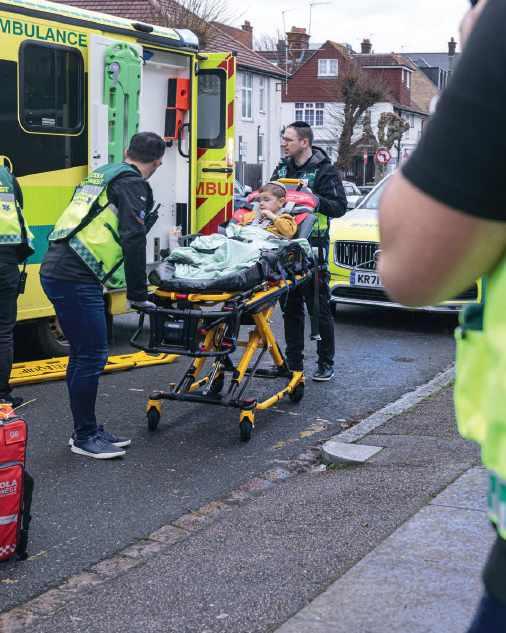


BY RABBIS JOSH LEVY AND CHARLEY BAGINSKY CO-LEADS OF PROGRESSIVE JUDAISM
Two years ago, the world changed.
On 7 October 2023, terror tore through Israel and the shockwaves reached every Jewish home across the world. What followed has been a time of grief, fear and deep unease, a test of whether we can still live by the values we say define us when the world seems determined to tear them apart.
Our Jewish Values was a statement signed by thousands who believed that even in that moment of anguish and rage, we had to hold fast to the moral foundations of Jewish life: compassion, justice, responsibility and hope. We wrote that our values
must not depend on circumstance.
Two years later, that conviction has been tested again – and still it stands.
But the world around us has shifted. Antisemitism, which many thought in retreat, has returned with new confidence. It seeps into public life, education and conversation.
Fear has hardened hearts. Voices once on the extremes now dominate the centre, while those who speak of justice and empathy are branded naïve or disloyal.
We have seen an Israeli minister invite Tommy Robinson to speak – and some Jews applaud him. We have seen those who challenge that descent into anger shouted down. And we have seen a rise in antiMuslim hatred; arson and threats against mosques and imams. Faith buildings no longer sanctuaries.
The Yom Kippur attack in Manchester brought that reality

home, a wound that cut deeply. It echoed the trauma of 7 October – a festival day turned to tragedy – and was met, again, by too much silence. Children went back to school unasked if they were all right. Colleagues and neighbours, quick to speak out on other injustices,
said nothing. The absence of words became its own kind of injury.
And yet, there was also something else: reaching out. Messages, vigils, flowers left at synagogue gates, people of other faiths simply saying: “We see you.” That sound of solidarity broke through the silence.




Proof that empathy, though fragile, still lives. Since then, we have come to see silence and solidarity as the twin languages of our time.
The same week fear deepened among Jews, Muslim leaders reached out to check on our communities. The same week mosques were threatened, rabbis wrote to their imams. There is still reaching out, and it still matters.
Two years on, we still hold those same four words: responsibility, compassion, justice, hope. They feel heavier now, but also holier. The world has shifted, but they still hold true. Our task is not to mirror the world’s rage, but to steady it. To reach out, even when silence feels safer.
The cracks remain, but our sages taught that the Ark held not only the whole tablets, but the broken ones too, a reminder holiness is not the absence of fracture, but the courage to carry it with care.







Is your school too big?
At Immanuel‚ it’s person al

Open Evening Wednesday 22 October 2025 • 5:15pm – 7:30pm


Small classes. Inspiring Jewish education. Exceptional pastoral care. A personalised approach where every child fl ourishes. Scholarships and bursaries available. Applications open for all year groups, including Year 6.
Sign up for our Open Evening and start your child’s journey
KIND | ASPIRATIONAL | RESPONSIBLE | CURIOUS








ANTIQUES
Antique – Reproduction – Retro Furniture (any condition)
Epstein, Archie Shine, Hille, G Plan, etc.
Dining Suites, Lounges Suites, Bookcases, Desks, Cabinets, Mirrors, Lights, etc.
House clearances
Single items to complete homes
MARYLEBONE ANTIQUES - 8 CHURCH STREET NW8 8ED 07866 614 744 (ANYTIME) 0207 723 7415 (SHOP)
closed Sunday & Monday
STUART SHUSTER - e-mail - info@maryleboneantiques.co.uk
MAKE SURE YOU CONTACT US BEFORE SELLING



Friendly Family Company established for 30 years We clear houses, flats, sheds, garages etc. No job too big or too small! Rubbish cleared as part of a full clearance. We have a waste licence. We buy items including furniture bric a brac. For a free quote please phone Dave on 07913405315 any time.


Confidential Bereavement Counselling for adults and children individually. Support Groups available. We offer in person, online and telephone counselling. Contact Jewish Bereavement Counselling Service in confidence. 0208 951 3881 enquiries@jbcs.org.uk | www.jbcs.org.uk












Call our Legacy Team on 020 8922
or











Join CST to help us protect our Jewish community. Sign up to a security training course.
North West London
Starting 20 October 6-week course
Monday evenings


North West London 21-22 December
Intensive course 2 full days
North Manchester
Starting 22 October 7-week course
Wednesday evenings
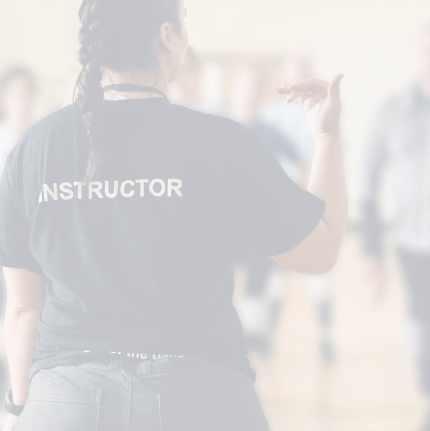

North Leeds
Starting 16 November Course takes place over 3 days

